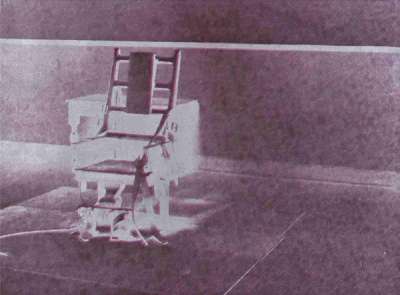
Electric Chair (F. & S. II.79)

Electric Chair (F. & S. II.79)
Signed Print
Andy Warhol
£13,500-£21,000Value
Indicator
$26,000-$40,000 Value Indicator
$23,000-$35,000 Value Indicator
¥120,000-¥190,000 Value Indicator
€16,000-€25,000 Value Indicator
$130,000-$210,000 Value Indicator
¥2,580,000-¥4,010,000 Value Indicator
$17,000-$26,000 Value Indicator
AAGR (5 years) This estimate blends recent public auction records with our own private sale data and network demand.
There aren't enough data points on this work for a comprehensive result. Please speak to a specialist by making an enquiry.
Medium: Screenprint
Edition size: 250
Year: 1971
Size: H 90cm x W 122cm
Signed: Yes
Format: Signed Print
TradingFloor
MyPortfolio
Your collection tracked in real time.
Build your portfolio, manage valuations, view return against your collection and watch works you're looking for.
Track auction value trend
Auction Results
| Auction Date | Auction House | Artwork | Hammer Price | Return to Seller | Buyer Paid |
|---|---|---|---|---|---|
| July 2022 | Christie's London - United Kingdom | Electric Chair (F. & S. II.79) - Signed Print | |||
| March 2021 | Forum Auctions London - United Kingdom | Electric Chair (F. & S. II.79) - Signed Print | |||
| January 2021 | Phillips London - United Kingdom | Electric Chair (F. & S. II.79) - Signed Print | |||
| November 2020 | Swann Auction Galleries - United States | Electric Chair (F. & S. II.79) - Signed Print | |||
| December 2019 | Il Ponte Auction House, Via Pontaccio - Italy | Electric Chair (F. & S. II.79) - Signed Print | |||
| November 2018 | Germann Auctions - Switzerland | Electric Chair (F. & S. II.79) - Signed Print | |||
| July 2014 | Bonhams New Bond Street - United Kingdom | Electric Chair (F. & S. II.79) - Signed Print |
Meaning & Analysis
As part of Andy Warhol’s Electric Chair series (1971), the print Electric Chair (F. & S. II.79) features an image of an empty electric chair, repurposed from a newspaper clipping about the high-profile executions of Julius and Ethel Rosenberg. Warhol creates a screen print of the photograph retaining much of its original, grainy quality. By appropriating an image from the mass-media to create this print work, Warhol deliberately mocks the then-dominant Abstract Expressionist style and contradicts the movement’s ideas on originality and authorship.
This print is a striking departure from the original Electric Chair painting that featured in the 1964 Death and Disaster series. The vibrant colours used in the negative renditions of the image create a dramatic juxtaposition to the grave and empty image that lies beneath. Warhol hints at the political with the print by using colours that are hard to ignore, such as the heavily contrasted, dark brown and blue tones on this print that make the original image almost unrecognizable, thus unsettling and forcing the viewer to confront this haunting image of death head on.
Warhol makes the point that these images are so often ignored in newspapers, and so here he transforms the media photograph into a work of fine art to be thoughtfully considered in the gallery setting. The representational, grainy texture juxtaposed with the abstract strokes of colour produce a ghostly contour and pulsating visual effect, bringing viewers to the moment of electrocution.









